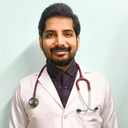Hernia: Types, Causes, Symptoms, Treatment
Discover everything about hernias, including their types, causes, symptoms, and treatment options. Learn how to identify and manage this common condition effectively.

Written by Dr Sonia Bhatt
Last updated on 3rd Jul, 2025
Millions suffer from hernias, a medical condition that develops when an internal organ or tissue forces its way through a weak spot in the muscle or connective tissue. The type of hernia depends on where it develops, but the most common is an abdominal wall hernia.
Leaving the hernias untreated can result in severe complications, cause significant detriment to one's quality of life, and, in most cases, result in the need for surgery. Keep reading to find out more about the types, causes, symptoms and treatment of hernia.
Types of Hernias
Hernias are classified according to their location and cause. Below are the primary types of hernias:
1.Inguinal Hernia
These develop when part of the intestine pushes through a weak spot in the groin. Men are much more susceptible to them, and these usually develop in the form of a bulge at the pubic bone.
2.Femoral Hernia
It develops when tissue bulges through the femoral canal at the top of the thigh. This type is more common in women because of its location.
3.Umbilical Hernia
Infants often have an umbilical hernia that develops around the navel area. Although it can be present in adults, people with poor abdominal muscles are especially at risk.
4.Hiatal Hernia
Part of the stomach pushes into the chest cavity, resulting in a hiatal hernia. It often leads to symptoms such as acid reflux and heartburn.
5.Incisional Hernia
An incisional hernia is the herniation of portions of an abdominal organ or other forms of abdominal tissue through a previous wound or incision.
Causes of Hernias
A combination of congenital and acquired factors can result in hernias. Prevention and intervention at an early stage rely on recognising these causes.
People who are born with weak muscles or connective tissues are later prone to developing hernias. This is especially true of umbilical hernias in infants.
Hernia formation develops with conditions like chronic coughing, pregnancy and heavy lifting which all increase intra-abdominal pressure. The abdominal wall can also be weakened by previous surgeries and injuries.
Straining the abdominal muscles due to excess body weight makes it more prone to hernias. Additionally, a sedentary life and an unhealthy diet make it worse.
Symptoms of Hernias
Knowing the symptoms of hernias is key to diagnosing and treating them in a timely manner. Hernia symptoms vary depending on the type.
Common symptoms across different types of hernias include:
A bulge that is visible in the affected area
Discomfort of pain when bending or lifting weight
A feeling of heaviness or pressure in the abdomen
Specific symptoms vary based on the type of hernia, with each presenting unique signs such as:
Inguinal Hernia: Groin pain and bulge which goes away when lying down
Hiatal Hernia: Difficulty swallowing, heartburn and acid reflux
Umbilical Hernia: Swelling near the navel, particularly in infants
Femoral Hernia: Lumps in the groin with discomfort
Incisional Hernia: Bulges and bowel obstruction
Warning signs indicating complications include:
Pain and redness at the hernia site can be severe and may require medical attention.
Nausea or the inability to pass stool may indicate a more serious underlying issue.
Symptoms of strangulation or obstruction, such as severe pain or vomiting, require immediate medical care.
Consult Top General Physician
Diagnosis of Hernias
In order to help treat effectively, the need for an accurate diagnosis is important. Physicians use several methods to determine the presence and type of a hernia.
A physical examination is the first step in diagnosing a hernia. The doctor checks for visible bulges and assesses the patient for his symptoms.
Different imaging techniques for hernias have different strengths. Inguinal hernias can be studied with ultrasound, which is portable and practical but operator-dependent.
CT (Computed Tomography) scans provide detailed insights into complex cases, while MRI (Magnetic Resonance Imaging) is the most sensitive and reliable method for diagnosing inguinal hernias.
Hernias must be distinguished from other conditions, such as lipomas or swollen lymph nodes, to ensure a correct diagnosis and appropriate treatment.
Treatment Options for Hernias
The treatment of the hernia depends on the type, the size and the severity of the hernia involved. Below are the common approaches:
In some cases, doctors may decide that immediate intervention is not necessary for asymptomatic or small hernias. Instead, lifestyle changes are often recommended to prevent further progression.
Surgery is the definitive treatment for most hernias, particularly those that cause pain or complications.
Hernia repair is commonly performed through open surgery, where a single large incision is made. This traditional method is effective but generally requires a longer recovery period.
Laparoscopic hernia repair involves smaller incisions and the use of a camera, offering quicker recovery and less postoperative pain compared to open surgery.
The focus of non-surgical hernia management is on relieving symptoms. Some key strategies include eating a high-fibre diet, maintaining a healthy weight, avoiding heavy lifting and quitting smoking. A belt, warm compress and ginger root are some home remedies to ease discomfort.
Post-Treatment Care and Recovery
Care after treatment is important for recovery without recurrence.
One should follow the doctor's instructions regarding wound care and activity restrictions.
It is important to stay off the legs for several weeks after the surgery.
Maintaining a healthy diet can assist in the healing process.
One should follow the surgeon's instructions, maintain a healthy weight, and adopt a healthy lifestyle to prevent hernia recurrence.
Regular exercise can help strengthen the core muscles.
Addressing underlying causes, such as obesity or chronic coughing, is essential.
Maintaining a healthy diet and avoiding activities that put excessive strain on the abdominal muscles is also important.
Complications of Untreated Hernias
Hernias can get serious if ignored. Below are some potential complications:
A strangulated hernia develops when the blood supply to the protruding tissue is cut off, leading to tissue death. This can also result in intestinal obstruction, causing intense pain and digestive issues.
Untreated hernias can lead to complications such as infections, chronic pain, and a decreased quality of life.
Prevention of Hernias
Reducing the risk of hernia formation involves adopting preventive measures.
Maintaining a healthy weight helps prevent strain on the abdominal muscles and lowers the risk of developing hernias.
Regular exercises like planks and yoga can strengthen the abdominal walls, further reducing the likelihood of hernias.
To minimise risk, individuals should avoid heavy lifting, use proper lifting techniques, and refrain from sudden movements or high-intensity workouts.
Smoking can worsen muscle weakness, contribute to chronic coughing, and hinder recovery after surgery, all of which can negatively affect hernia healing.
Conclusion
A hernia can develop when tissue protrudes through weakened muscles, which, if left untreated, can cause discomfort and lead to complications. Symptoms and treatment options vary depending on the hernia type.
A healthy lifestyle, which includes maintaining a healthy weight, engaging in regular exercise, and avoiding risk factors, can reduce the likelihood of developing a hernia and contribute to overall well-being.
Consult Top General Physician
Consult Top General Physician

Dr. Jawwad Mohammed Kaleem
General Practitioner
4 Years • MBBS
Hyderabad
Apollo 24|7 Clinic, Hyderabad

Dr. Syed Yaseen Ahmed
General Practitioner
7 Years • MBBS
Hyderabad
Apollo 24|7 Clinic, Hyderabad

Dr. Hrishikesh Shivakumar
General Physician/ Internal Medicine Specialist
9 Years • MBBS, MD
Bangalore
Apollo 24|7 Clinic - Karnataka, Bangalore

Dr. Liritha C
General Physician/ Internal Medicine Specialist
5 Years • MBBS, MD (GENERAL MEDICINE)
Hyderabad
Apollo 24|7 Clinic, Hyderabad

Dr. Anshul Maheshwari
General Practitioner
5 Years • MBBS
Lucknow
Apollo 24|7 Clinic - Uttar Pradesh, Lucknow
Consult Top General Physician

Dr. Jawwad Mohammed Kaleem
General Practitioner
4 Years • MBBS
Hyderabad
Apollo 24|7 Clinic, Hyderabad

Dr. Syed Yaseen Ahmed
General Practitioner
7 Years • MBBS
Hyderabad
Apollo 24|7 Clinic, Hyderabad

Dr. Hrishikesh Shivakumar
General Physician/ Internal Medicine Specialist
9 Years • MBBS, MD
Bangalore
Apollo 24|7 Clinic - Karnataka, Bangalore

Dr. Liritha C
General Physician/ Internal Medicine Specialist
5 Years • MBBS, MD (GENERAL MEDICINE)
Hyderabad
Apollo 24|7 Clinic, Hyderabad

Dr. Anshul Maheshwari
General Practitioner
5 Years • MBBS
Lucknow
Apollo 24|7 Clinic - Uttar Pradesh, Lucknow